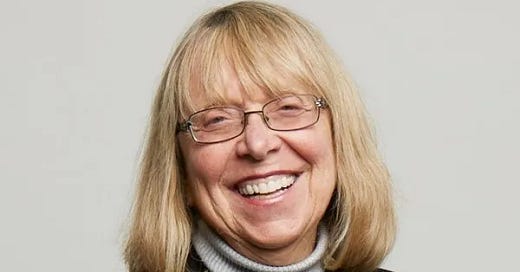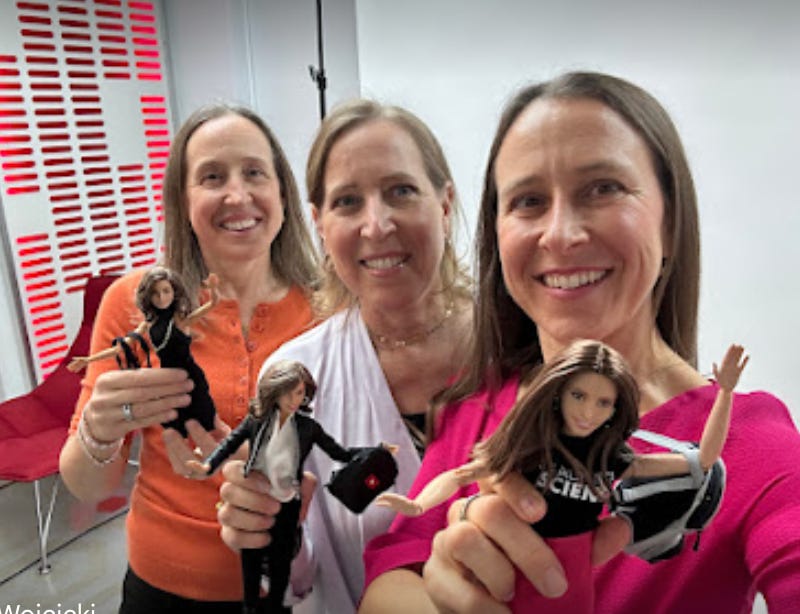Motherhood Identity Series with Esther Wojcicki, the Godmother of Silicon Valley
The bestselling author and journalist reflects on raising three powerhouse daughters, finding joy in early motherhood, and why independence starts in toddlerhood.
When you’ve spent your life shaping minds, raising trailblazers, and redefining what success looks like — in the classroom, in the tech world, and at home — motherhood becomes more than just a role. It becomes a philosophy.
Esther Wojcicki, the award-winning journalist, educator, bestselling author, and mother of three remarkable daughters (including the former CEO of YouTube and the founder of 23andMe) says her identity has been defined and grounded through every chapter of life by being a mom.
In this deeply personal interview, Esther shares what it was like to parent without Google, postpartum without a roadmap, and raise fiercely independent girls who would go on to change the world. From cereal-pouring toddlers to zoo-voting weekends, Esther brings her signature warmth, wit, and wisdom to the conversation—along with the lessons that inspired her global parenting framework, TRICK (Trust, Respect, Independence, Collaboration, and Kindness).
Now, with the launch of her Parenting TRICK app, Esther is once again offering a blueprint—not just for raising successful people, but for holding onto your own sense of self while doing it.
We are thrilled to welcome the Godmother of Silicon Valley for this week’s Motherhood Identity Series.
Looking back to the beginning of your motherhood journey, what do you remember most about your pregnancies with your daughters? Were your experiences similar across all three pregnancies, or did they differ in unexpected ways?
The early months were rough: I was constantly nauseated and slept a lot. My husband used to joke that I had narcolepsy because I’d fall asleep mid-dinner. But once I got through the first trimester, things usually leveled out. That said, each pregnancy was different. And every baby had their own personality right from the start.
What was your postpartum experience like after each birth, both physically and emotionally? Were there any challenges that surprised you, especially in those early newborn days?
It's hard to say exactly how postpartum was—I didn’t really have a reference point. There was no internet, no guide to tell you what was “normal.” My firstborn, Susan, was incredibly easy. I always say she was born polite. So, I thought, “Wow, this is simple—I’ve got this!” And I had another baby pretty quickly. Janet was born just 18 months later. But unlike Susan, Janet was not polite: she cried all the time, about everything. I suddenly found myself very, very busy.
How did becoming a mother for the first time shift your sense of identity? Did you feel prepared for that transformation—or did it catch you off guard?
I was excited to be a mom. I thought a lot about my own mother and the fun we had growing up, and I wanted to recreate that joy and curiosity with my own kids. We went on toy-hunting adventures, spent time at the park and zoo, it was a very active, happy time. I didn’t feel lost—I felt lucky.
You’ve raised three incredibly accomplished daughters. In those early years, how did you navigate the tension between your own ambitions and the demands of motherhood?
When my daughters were born, I took time off from teaching, but I always made sure I stayed engaged in meaningful work. I’ve always felt driven to do things that make the world better. Even while raising my daughters, I got deeply involved in community projects, which kept my sense of purpose alive. That mindset eventually became part of my work with other parents, and now it’s at the heart of the Parenting TRICK app—my life’s work, really.
You’ve spoken often about the power of independence. How did that value show up in your own parenting, especially during the early stages of raising young children?
I gave my kids a lot of independence, even as toddlers. When Susan and Janet were little, I taught them how to make their own breakfast: cereal and milk. I kept a small jug of milk in the fridge so they could pour themselves cereal within reach. It was messy, of course, but they felt empowered. They’d even turn the TV on themselves—so I’d come downstairs to find them happily eating breakfast and watching cartoons.
That independent spirit just grew from there. They walked to friends' houses, made dessert every night (usually Jell-O or chocolate pudding), and helped with grocery shopping. On weekends, they voted on our activities— we spent a lot of time at the San Francisco Zoo.
Janet, in particular, was fiercely independent. When we were living in Switzerland, she was just three years old and decided she wanted to be in the five-year-old class at the United Nations school. She simply moved herself up — and wasn’t discovered until six weeks later! When they tried to move her back, she refused and enrolled herself in a local French-speaking school instead.
Later, when we returned to the U.S., she announced she wanted to go to kindergarten—not preschool. She was four. I told her they didn’t take four-year-olds. She told me she’d go to private school. And she did. She fit right in with the five- and six-year-olds and absolutely thrived.
Did your approach to motherhood evolve between your first and third child? What did you let go of or embrace more fully with each successive child?
Each of my daughters had a different personality, and with each one, I became more relaxed and hands-off. I realized they were capable—I could teach them how to do things, and they could take it from there.
They helped clean the house, made their own snacks, and took responsibility for their routines. It gave them confidence, and it made our home life a little smoother. This kind of self-direction is what I now call “panda parenting”—nurturing, but empowering. I was there to guide and support them, but I gave them space to explore, make decisions, and even fail.
What role did community—whether family, friends, or mentors—play in supporting you through pregnancy and postpartum?
Community was everything. We built our house in a neighborhood filled with other young families, but there were no babysitters—because everyone had young kids! So, I started a babysitting co-op. It began with ten families and eventually grew to about 55 or 60. Parents took turns watching each other’s kids so we could all have an occasional night out. We had a rotating secretary to organize everything. It turned into a beautiful, supportive network, and many of us remained close for years.
You've helped countless families through your TRICK framework. How did those principles emerge from your own lived experience as a mom, particularly during the earliest phases of motherhood?
TRICK wasn’t something I planned—it just emerged organically from how I lived and parented. I trusted my kids deeply. I respected their ideas, even when they were wacky—and sometimes they worked! I gave them independence from an early age. I didn’t entertain them—they entertained themselves. The only exception was reading: we always read books together, especially in the afternoons. We visited the library weekly, loaded up a laundry basket full of books, and they got to choose whatever they wanted.
Collaboration was key, too. They helped choose groceries, planned our weekends, even picked the rug for their bedrooms. And of course, kindness was constant. We all need kindness—especially when we mess up. That’s what TRICK is built on: Trust, Respect, Independence, Collaboration, and Kindness.
In the decades since becoming a mother, how has your definition of "successful parenting" evolved? What would you tell your younger, new-mom self now?
I would tell myself: don’t move to Switzerland with a three-week-old! That was way too hard. And maybe don’t buy a big two-story house—keep life simple.
Most of all, I’d say: try to enjoy your children more. Stop worrying so much about what might go wrong.
I’d also remind myself not to constantly ask others—or today, check the internet—to see if your child is “on track.” Kids develop at their own pace, and comparing only leads to unnecessary stress. The truth is, the majority of the time the kids are completely fine. If you’re ever genuinely concerned, talk to your pediatrician. But all that unsolicited advice online often does more harm than good by creating anxiety, not answers.
Motherhood is often described as a lifelong identity. How does being a mother continue to shape your life and leadership today—even as your daughters have long been grown?
I agree completely—motherhood is forever. Whether your child is five months old or fifty, you never stop being their mom. You’re the one they turn to when they fall, when they fail, or when they need support. That’s why it’s so important for parents to be kind and present, especially when kids mess up. If they know they can come back to you—without judgment—that’s everything. My daughters have brought me plenty of wild stories over the years, and I’ve always tried to be the person they could count on, no matter what.









